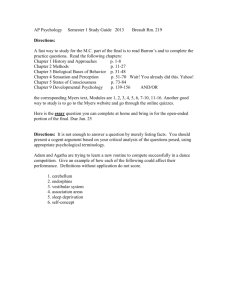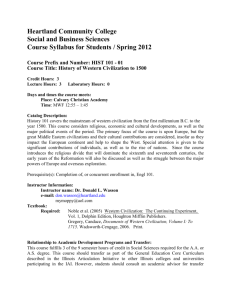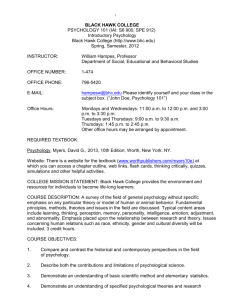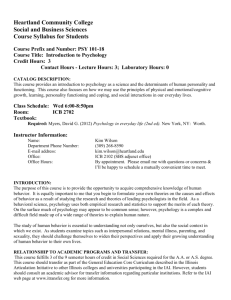PSY 101 18 BERRY FA 11 - Heartland Community College
advertisement
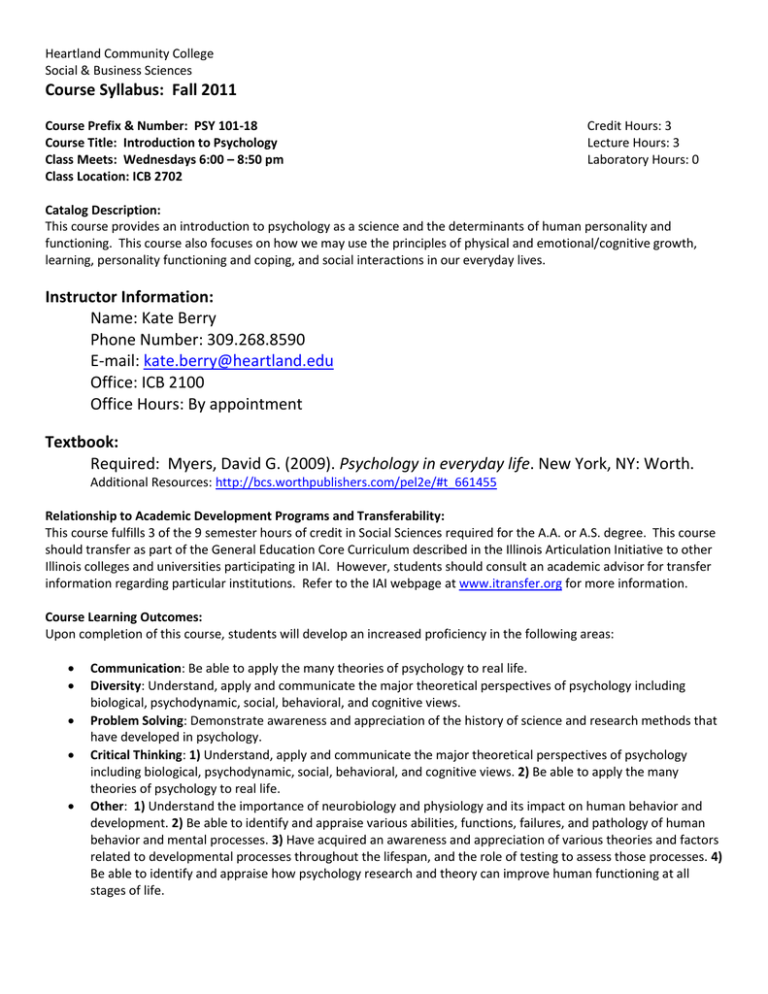
Heartland Community College Social & Business Sciences Course Syllabus: Fall 2011 Course Prefix & Number: PSY 101-18 Course Title: Introduction to Psychology Class Meets: Wednesdays 6:00 – 8:50 pm Class Location: ICB 2702 Credit Hours: 3 Lecture Hours: 3 Laboratory Hours: 0 Catalog Description: This course provides an introduction to psychology as a science and the determinants of human personality and functioning. This course also focuses on how we may use the principles of physical and emotional/cognitive growth, learning, personality functioning and coping, and social interactions in our everyday lives. Instructor Information: Name: Kate Berry Phone Number: 309.268.8590 E-mail: kate.berry@heartland.edu Office: ICB 2100 Office Hours: By appointment Textbook: Required: Myers, David G. (2009). Psychology in everyday life. New York, NY: Worth. Additional Resources: http://bcs.worthpublishers.com/pel2e/#t_661455 Relationship to Academic Development Programs and Transferability: This course fulfills 3 of the 9 semester hours of credit in Social Sciences required for the A.A. or A.S. degree. This course should transfer as part of the General Education Core Curriculum described in the Illinois Articulation Initiative to other Illinois colleges and universities participating in IAI. However, students should consult an academic advisor for transfer information regarding particular institutions. Refer to the IAI webpage at www.itransfer.org for more information. Course Learning Outcomes: Upon completion of this course, students will develop an increased proficiency in the following areas: Communication: Be able to apply the many theories of psychology to real life. Diversity: Understand, apply and communicate the major theoretical perspectives of psychology including biological, psychodynamic, social, behavioral, and cognitive views. Problem Solving: Demonstrate awareness and appreciation of the history of science and research methods that have developed in psychology. Critical Thinking: 1) Understand, apply and communicate the major theoretical perspectives of psychology including biological, psychodynamic, social, behavioral, and cognitive views. 2) Be able to apply the many theories of psychology to real life. Other: 1) Understand the importance of neurobiology and physiology and its impact on human behavior and development. 2) Be able to identify and appraise various abilities, functions, failures, and pathology of human behavior and mental processes. 3) Have acquired an awareness and appreciation of various theories and factors related to developmental processes throughout the lifespan, and the role of testing to assess those processes. 4) Be able to identify and appraise how psychology research and theory can improve human functioning at all stages of life. Course Outline: This outline is a brief representation of what each instructor will include while teaching this class. There may be additional material that is included; each instructor may vary the presentation of the topics as well as how much time is spent on each topic. 1. 2. 3. 4. 5. 6. 7. 8. 9. 10. 11. 12. 13. 14. 15. 16. Psychology’s Roots Research Methods Neuroscience Consciousness Human Development Through the Lifespan Gender and Sexuality Sensation and Perception Learning Memory Thinking, Language, and Intelligence Motivation and Emotion Stress and Coping Personality Psychological Disorders Therapy Social Psychology Course Policies: Methods of Evaluation Exams: Students will be given four unit exams and one comprehensive final exam. Material covered on the exams will be taken from lectures, assigned readings, the textbook, and videos. Each exam is worth 50 points. IF you complete ALL course requirements and your class average at the end of the semester prior to the final exam is a 90% or above, you will not be required to take the comprehensive final exam. If circumstances cause you to miss a unit exam, you will be given the option of taking a make-up exam in the Testing Center. Students with an emergency can miss ONE exam without having their grade suffer. You must request in writing a make-up exam and you will have only ONE week to complete, or forfeit the opportunity. Writing Assignments: 1) Students will be required to write six Journal Entries on a class topic or question throughout the semester. Each journal is worth 5 points. Entries must be at least one page typed, double-spaced. No make-ups or late journals accepted. 2) Students will be required to write information for two projects that will be completed outside of class. Each project is worth 25 points. It will include an audio/visual presentation to the class. 3) Students will be required to submit one Reflective Essay at the end of the semester. This essay must discuss essential course topics and research in the field of psychology. The essay must be at least three pages typed, double-spaced and include a works cited page. The essay is worth 20 points. NOTE: All assignments are due on the date announced. Late work will not be accepted. Grading System Total Points Possible: Unit Exams (4) – 50 pts Final Exam (1) – 50 pts Journals (6) – 5 pts Projects (2) – 25 pts Essay (1) – 20 pts 350 pts 200 50 30 50 20 Grading Scale A = 100% - 90% B = 89% - 80% C = 79% - 70% D = 69% - 60% F = 59% and below Required Writing and Reading Every instructor will require a minimum of 10 pages (equivalent to 10 typed, double-spaced, pages) of writing from each student. This may be accomplished through a combination of various writing requirements such as: term papers, essay questions on exams, journaling assignments, writing within projects, reflective papers, or other written assignments. Attendance Policy Student attendance is required. Attendance will be noted for each class, in addition to exam days. Student Conduct Please behave in an appropriate manner for the classroom out of respect for the instructor and your peers. Cell phones and other audio devices must be turned off during instruction time. Students are expected to participate in class activities and attend all class sessions. I reserve the right to dismiss or drop you from the course if your behavior interferes with the learning environment. A student may also be removed from the course if their grade is poor and they have poor attendance. Incompletes (See the policy on Incompletes in the Heartland Community College Catalogue) Course Evaluation Online course evaluations are completed during the last three weeks of class by selecting the link on your myHeartland account. **Syllabus Disclaimer: If the contents of the syllabus must be changed at any time, I will notify the students in class. The changes apply to ALL students enrolled in the course. General Information for Students Testing Services (located in Student Commons Building 2001) Testing Services provides a secure testing environment for students who are enrolled in online, hybrid, and other distance learning courses; have a documented disability; or need to take a make-up exam. Testing accommodations for students having documented disabilities must be arranged by the student through Disability Support Services, and Testing Services will only administer make-up exams at the request of the instructor. For more information, please call (309) 268-8050. Services in Academic Support Center (Raab Road campus) Library The Library provides fast and free access to credible information from a full range of resources including books, online journals, videos, newspapers, online music, class reserves, and interlibrary loan. Individualize research by appointment or come in anytime. See the Library tab in myHeartland, email library@heartland.edu or call (309) 268-8292 for details. Tutoring Services Tutoring Services provides tutoring in various forms at no cost to Heartland students in Normal, Pontiac, and Lincoln. Tutors are available at convenient times throughout the week. Study groups are also available by request. For more information about services available at each location, please call (309) 268-8231 (Normal), (815) 842-6777 (Pontiac), or (217) 735-1731 (Lincoln). Disability Support Services Disability Support Services (DSS) ensures that students with disabilities have equal access to the college’s programs, services and activities through the provision of reasonable accommodations as mandated in Section 504 of the Rehabilitation Act and the Americans with Disabilities Act. DSS offers a wide range of services to support students with disabilities, including: assistive technology, document conversion services, personnel, classroom and testing accommodations. Students with a documented disability who wish to discuss academic accommodations should call (309) 268-8259 for details. Open Computing Lab The Open Computing Lab provides free computing for HCC students at convenient times throughout the week. The computer lab is staffed by trained Lab Assistants and offers the use of approximately 70 computers, a scanner, a laser printer, and an electric typewriter. Writing Services Writing Services provides guidance for writers on assignment comprehension, critical thinking and the stages of the writing process. Writing Services is staffed by English faculty with years of experience in the teaching of writing. In every session, faculty work with writers to explore and develop their own ideas as appropriate to the needs of their readers and to learn the rhetorical strategies necessary for effective communication. For more information, please call (309) 268-8231. Services in Community Commons Building (Raab Road campus) Academic Advising Academic advisors provide information to students about degree/program requirements, transferability of courses, GPA, and enrollment. Academic Advising may also provide workshops on time management, IRIS navigation, or specific career fields. For more information, please call (309) 268-8033. Career Services Career Services offers guidance and resources to assist students determine their career goals, develop employability and job search skills, and connect with potential employers. In addition, two experiential learning programs, job shadowing and internships, provide students with relevant work-based learning opportunities. Job shadowing assists students in clarifying their career goals. Internships help students “bridge the gap” between the academic environment and employment in their chosen career fields. For more information, please call Career Services at (309) 268-8034. Counseling Services The personal development counselor provides confidential and professional counseling for both emergency and personal issues. Services also include referrals to local community resources. For more information, please call (309) 268-8033. Financial Aid Office The Financial Aid Office provides information on programs and types of financial aid available to students. For more information, please call (309) 268-8020. Transcripts Official and unofficial transcripts may be obtained at the Student Records desk. Transcripts may also be obtained at Heartland’s Lincoln and Pontiac sites. Transcripts must be requested in writing. The form is available online (http://www.heartland.edu/transcripts/index.jsp) or at the Student Records desk. Academic Integrity and Plagiarism Academic Integrity Academic integrity is a fundamental principle of collegial life at Heartland Community College and is essential to the credibility of the College’s educational programs. Moreover, because grading may be competitive, students who misrepresent their academic work violate the right of their fellow students. The College, therefore, views any act of academic dishonest as a serious offense requiring disciplinary measures, including course failure, suspension, and even expulsion from the College. In addition, an act of academic dishonesty may have unforeseen effects far beyond any officially imposed penalties. Violations of academic integrity include, but are not limited to cheating, aiding or suborning cheating or other acts of academic dishonesty, plagiarism, misrepresentation of data, falsification of academic records or documents and unauthorized access to computerized academic or administrative records or systems. Definitions of these violations may be found in the college catalog. Plagiarism Plagiarism is the presenting of others’ ideas as if they were your own. When you write a paper, create a project, do a presentation or create anything original, it is assumed that all the work, except for that which is attributed to another author or creator, is your own. Plagiarism is considered a serious academic offense and may take the following forms: Copying word-for-word from another source and not giving that source credit. Paraphrasing the work of another and not giving that source credit. Adopting a particularly apt phrase as your own. Using an image or a copy of an image without crediting its source. Paraphrasing someone else’s line of thinking in the development of a topic as if it were your own. Using another person’s project or another person’s work as if it were your own. [Adapted from the Modem Language Association’s MLA Handbook for Writers of Research Papers. 7th ed. New York: MLA, 2009:51-61] Note that word-for-word copying is not the only form of plagiarism. The penalties for plagiarism may be severe, ranging from failure on the particular piece of work, failure in the course or expulsion from school in extreme cases. Many plagiarism problems can be remedied by citing the sources of the original work. When in doubt, cite the source according to the style your instructor directs. Usually this is APA or MLA Style. Don’t be daunted by citing sources which are not books. You can cite everything, including pamphlets, maps, cereal boxes, telephone conversations, movies, television shows, Internet and world-wide web sites. Philosophy of Grades The Heartland Community College grading philosophy grows out of our vision of educational excellence. This common philosophy provides a framework for each academic division and instructor as they establish their own individual course grading system, evaluation methods, and course policies using the shared general rubrics for letter grades given below. Letter grades serve as a vehicle to promote meaningful evaluation of student achievement, to inform students of academic progress, and, as necessary, to improve student performance, habits, and practices. Using a letter grade as a prerequisite for subsequent courses means we believe that the grade was assigned through a conscious judgment about a student’s readiness to proceed to more advanced study. At Heartland, students’ academic achievement is measured by their mastery of course objectives and content. We challenge students to meet these recognized standards of achievement and we assign grades based on their success in doing so. Simply stated, we believe that the responsibility for academic achievement rests with the student and that holding students responsible for their learning promotes their academic growth. Letter Grade Rubrics “A” This grade represents consistently outstanding performance that demonstrates superior understanding and skillful use of important course concepts. Performance at this level signifies that the student is extremely well prepared to continue with more advanced study of the subject. “B” This grade represents performance significantly beyond the level necessary to achieve the course objectives. Work is of high quality but not consistently at an outstanding level. Performance at this level signifies that the student is well prepared to continue with more advanced study of the subject. “C” This grade represents an acceptable achievement of the course objectives. Performance at this level signifies that the student is reasonably well prepared to continue with more advanced study of the subject. “D” This grade represents less than adequate performance. It signifies questionable readiness to proceed with more advanced study of the subject. “F” This grade reflects unacceptable performance. The student is not yet ready to proceed with more advanced study of the subject, and must repeat the course successfully to receive credit. PSY 101-18 Fall 2011 Date Wednesdays 6-8:50 Material Covered August 24 Myers Ch 1 & 2 Topic: What is Psychology? August 31 Myers Ch 2 & 3 Topic: The Mind Assignments September 7 Myers Ch 3 & 4 Topic: Human Development September 14 Unit 1 EXAM Myers Ch 5 Topic: Sensation & Perception September 21 Myers Ch 6 Topic: Learning Journal #2 DUE September 28 Myers Ch 7 Topic: Memory Project #1 DUE October 5 Myers Ch 8 Topic: Thinking, Language & Intelligence Journal #3 DUE October 12 Unit 2 EXAM Topic: Current Events October 19 Myers Ch 9 Topic: Motivation & Emotion Journal # 4 DUE October 26 Myers Ch 10 Topic: Stress Project # 2 DUE November 2 Myers Ch 11 Topic: Personality Journal # 5 DUE November 9 Unit 3 EXAM Myers Ch 12 Topic: Psychological Disorders November 16 Myers Ch 12 & 13 Topic: Treating Psychological Disorders November 23 NO CLASS November 30 Unit 4 EXAM Myers Ch 14 Topic: Social Psychology December 7 Wrap-Up & Review December 14 FINAL EXAM (6:00 pm) Unit 1 Exam: Chapters 1 – 4 Unit 2 Exam: Chapters 5 – 8 Unit 3 Exam: Chapters 9 – 11 Unit 4 Exam: Chapters 12 – 13 Final Exam: Chapters 1 – 14 Journal # 1 DUE Journal #6 DUE Reflective Essay DUE
